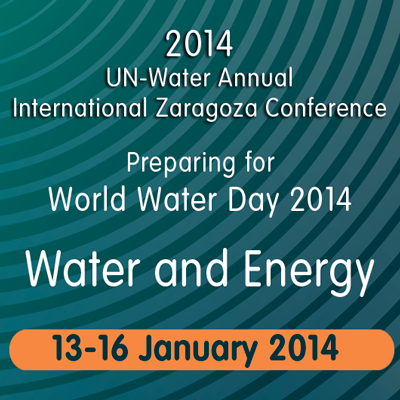UN-Water Conference participants stress the interface between water and energy and call for effective and fair partnerships
VIENNA/ZARAGOZA(SPAIN), 16 January 2014- Representatives from the United Nations agencies, governments, businesses, non-governmental organizations (NGOs), industry experts from around the world gathered in Zaragoza, Spain to discuss the importance of water and energy at a UN-Water Conference in preparation for World Water Day 2014.
During the three day conference, industry experts noted that the world faces two enormous challenges; ensuring a sustainable supply of water to 768 million people with no access to water and providing energy access to approximately 1.4 billion people, one in five globally, lacking electricity to light their homes or conduct business. With the world’s population expected to grow from 7 billion today to 9 billion by 2050 and 40% of the world’s population still using wood, coal, charcoal, or animal waste to cook their food thereby breathing in toxic smoke that causes lung disease and killing nearly four million people a year, participants noted overwhelmingly that water and energy are inextricably linked and interdependent.

Water is needed for primary energy extraction and processing and water requirements for energy is growing with economic growth, demographic shifts and changing lifestyles. Clean drinking-water supply requires energy – desalination in particular. Water demand could exceed 44% of the available annual resources by 2050 while energy demand could experience a 50% increase by the same date.
IIASA research scholar, Paul T. Yillia (Dr. techn) representing the Vienna based Sustainable Energy for All (SEforALL), an initiative of the UN Secretary-General, noted that the Water-Energy Nexus is much more than just the links. “It is more about exploring shared uncertainties, searching for synergy and gaining insight into plans within others’ sphere of control and influence,” he said. The goal is to find solutions to the constraints of both - to optimize resource use and eliminate inefficiencies in the system”, he noted.
Beyond water and energy needed for each other, Dr. Yillia presented additional dimensions including global governance failures, economic disparity, food security, water security, energy security, geopolitical conflict, population and economic growth and environmental pressures.
The general consensus among global water experts is that the world cannot afford energy policies that do not take into account the fact that water is needed to produce hydroelectricity as well as cooling in the manufacturing of power generation. Similarly, they called for rethinking of water policies that do not consider how much they need energy to pump, purify, transport, pressurize and clean water.
Representatives of water companies emphasized that without energy you cannot do anything when it comes to water management; water is heavy, so a lot of energy for transportation is needed, but this energy is still too expensive. For a water utility, 30% of its operational cost is represented by the cost of energy needed to manage water. It’s clear that water poverty and energy poverty go hand in hand, so there must be social policies that consider both water and energy if these policies are intended to be inclusive.
For his part, the Secretary-General’s Special Representative on Sustainable Energy for All and Chief Executive Officer of the initiative noted from New York that energy and water are two sides of the same coin. “We recognized that energy technologies are very thirsty and the investments we need to make water and energy available to all, the scale and speed of change we want to see happen, will only come from genuine partnerships,” he underscored.



